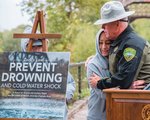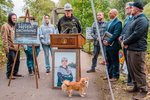



.jpg)
Fresh flowers adorned the now 6-month-old memorial along the Willapa Hills Trail for Zachary Rager, a Centralia teen who jumped from a railroad trestle bridge and drowned in the Chehalis River in March, as Rager’s family and friends stood alongside state representatives Wednesday morning for the announcement of new legislation named in Rager’s honor that’s intended to prevent future cold water shock drownings.
Rep. Peter Abbarno, R-Centralia, and Sen. John Braun, R-Centralia, will introduce companion pieces of legislation — nicknamed “Zack’s Law” — during the upcoming legislative session. The law is intended to increase the warning signage around bridges and recreational water sites for cold water shock, a physical response to sudden immersion in cold water that includes increased heart rate, faster breathing and potentially uncontrolled gasping and uncontrolled movement.
Cold water shock is most common in water 59 degrees Fahrenheit or cooler, but can occur in waters up to 77 degrees.
“We need people to understand the actual dangers of some of these bodies of water,” Abbarno said at the press conference. “It may not be enough to say ‘don’t swim,’ it may not be enough to say ‘don’t jump.’ We need to let people know that even though they may be a good swimmer, cold water shock can impact any swimmer however experienced you are. Bottom line is ‘Zack’s Law’ is going to save lives.”
The legislation would require officials to include a warning about cold water shock onto future signage on or near bridges to deter jumping, would encourage officials to examine relevant recreation sites to determine whether warning signage is needed, and would allow local government agencies to accept donations from private citizens to erect new signs.
“It’s something that’s not just fiscally responsible, it’s flat out the right thing to do,” said Abbarno in an interview with The Chronicle.
If passed, the bill would also require the Washington state parks and recreation commission to install a warning sign in memory of Rager on or near the bridge on the Willapa trail by January 2023.
Rager’s family thanked the community for their ongoing support and spoke in favor of “Zach’s Law.”
“I miss my Zachary,” said Rager’s mother, Kim Rager, at the press conference. “Zachary is my best friend, he’s my only son. I know that Zachary would want this bill to go on further. If he knew the dangers … I think he would have thought twice. I don’t want anyone to go through what I’m still going through daily and will go through the rest of my life.”
In the wake of Rager’s death, his family reached out to multiple agencies — including Abbarno’s and Braun’s offices — about the possibility of drafting legislation to educate the community about cold water shock. Abbarno and Braun worked closely with Rager’s family when drafting “Zack’s Law.”
“He (Rager) was an amazing kid. He did so much for everybody. He lived his life to the fullest,” said Rager’s stepfather, Lee Hines.
It was a sunny, 72-degree March day when Rager and three of his friends went out onto the railroad trestle bridge crossing the Chehalis River. Rager told his friends that he wanted to jump in — which is something he had done before with no problems — but this time, after he started swimming to the bank, he called out to his friends for help due to the cold temperature of the water.
One of his friends got in the water and reached Rager — but also began to struggle due to the effects of the cold water. The friend safely made it back to shore, but during the swim, Rager had reportedly gone “limp” and slipped out of his friend’s grasp.
The Lewis County Sheriff’s Office led a search with the Thurston County Dive Team and divers recovered Rager’s remains from the river on April 19.
“This (legislation) is something that needs to be done and the sheriff’s office truly supports what’s happening today,” said Lewis County Sheriff Rob Snaza at the press conference. “We’re very excited. I’m sorry that we’re under these circumstances to be here today for this, but this is a positive step for addressing the issue that we’re facing here.”
Legislators will work with the Department of Transportation and the state Parks department to come up with uniform phrasing for the signs, which will be included in the legislation.
The legislation will be pre-filed in December for the upcoming legislative session.